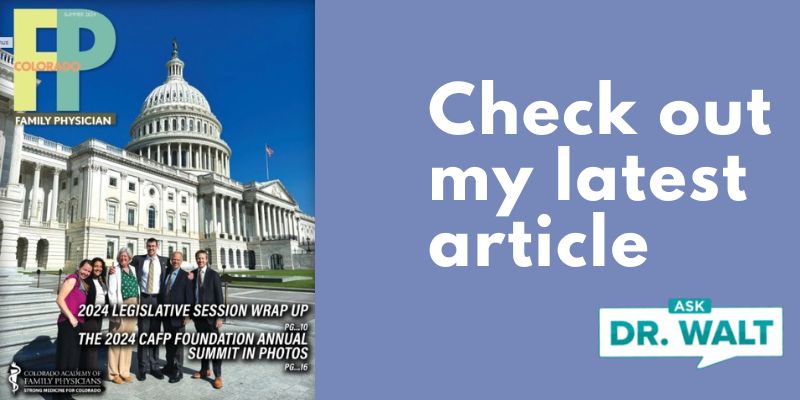
Today, on our 51st Wedding Anniversary, can we share our story with you?
November 17, 2024
November 20, 1944 – Dad is transferred to another hospital while the 3rd Infantry Division marches on
November 20, 2024I’ve been honored to write a quarterly column, “Vaccine News You Can Use” for the Colorado Family Physician journal for a number of years. Below is the Summer 2024 edition of CFP (I forgot to post it this last summer. Sorry about that!).
 –
–
News Items:
- Improvements seen in child vaccination timeliness
- Low vaccination rates persist for Medicaid beneficiaries
- COVID vaccination tied to lower risk of long COVID
- Measles cases jump from unvaccinated travelers returning to US; CDC issues plea
- Practice Alert: ACIP recommends IPV for unvaccinated or incompletely vaccinated adults
- Measles’ deadliest sequelae – Do you know about this dire consequence?
- More Vaccine News You Can Use
VIEW ONLINE HERE. VIEW THE ENTIRE TEXT BELOW:
1. Improvements seen in child vaccination timeliness
A study published in JAMA Network Open involving National Immunization Survey-Child data found improvements in vaccination timeliness from 2011 to 2021, highlighting the on-time receipt of the combined 7-vaccine series increased from 22.5% to 35.6%. The rates of improvement differed by socioeconomic factor, being greatest among children from higher-income families. The authors wrote, “Disparities in timely vaccination signal the need for an increased focus on access to and quality of immunization services for lower-income families and children without private health insurance.”
2. Low vaccination rates persist for Medicaid beneficiaries
A report found that Medicaid beneficiaries continue to have low vaccination rates, noting “Vaccination rates are suboptimal for all adults, regardless of health coverage, but for adults enrolled in Medicaid, the vaccination rates for a range of vaccinations are lower than for adults with private health insurance coverage, including flu, tetanus, herpes zoster, hepatitis A, hepatitis B, and HPV vaccinations.” In the Medicaid population, flu vaccination rates are a particular concern, being up to 10% lower than the general population and 30% lower than people with Medicare.
3. COVID vaccination tied to lower risk of long COVID
An analysis of data from adults in Michigan reported that those who were fully vaccinated against COVID before getting infected were 43% and 58% less likely to experience long COVID symptoms at 30- and 90-days post-infection, respectively, compared with unvaccinated individuals. The findings were published in the journal Annals of Epidemiology. In 2022, approximately 7% of U.S. adults self-reported that they had had long COVID, which researchers defined as symptoms for at least 3 months after testing positive or being diagnosed by a doctor, according to the CDC. “These findings support the growing evidence that COVID vaccination may be an important tool to reduce the burden of long COVID,” the authors concluded.
4. Measles cases jump from unvaccinated travelers returning to US; CDC issues plea
Measles outbreaks in the US and abroad are raising health experts’ concern leading the CDC to issue a health advisory. Cases in the first three months of 2024 were 17 times higher than the average number seen in the first 3 months of the previous 3 years in the US. There has also been a dramatic rise in measles cases in other countries. The CDC recommends unvaccinated children and international travelers get vaccinated. “Unvaccinated Americans who got infected in the Middle East and Africa and brought measles back to the US” are a major source of this year’s outbreaks. Of the US cases, 47% percent of patients were children under 5 years old, and 82% of infections were among people who were either unvaccinated or whose vaccination status is unknown. The CDC noted that around 91% of measles cases recorded in the US since January 2020 were among people who were unvaccinated or had an unknown vaccination status.
5. Practice Alert: ACIP recommends IPV for unvaccinated or incompletely vaccinated adults
Here are some excerpts from a recent AFP Practice Alert: Adults known or suspected to be unvaccinated or incompletely vaccinated against polio should receive a primary series of IPV. Vaccinated adults who are at risk of exposure can receive a booster dose of IPV. Only one lifetime booster is needed. For practical purposes, adults who were born and grew up in the United States can be presumed to be vaccinated, even if no childhood vaccine records are available. A complete vaccine series is defined as three or more doses of OPV, IPV, or a combination, with the last dose administered after 4 years of age. Adults who were born and raised outside of the US who do not have documentation of polio vaccine should be offered IPV. A primary series of IPV for adults comprises two doses 4 to 8 weeks apart and a third dose 6 to 12 months after the second dose. Travelers to countries where polio is still endemic are at increased risk and should consider a booster dose of IPV. These new recommendations are the result of continued circulation of wild and vaccine-derived poliovirus worldwide, vaccine hesitancy leading to suboptimal vaccination rates in some communities, and concern that a reemergence of paralytic polio in the US is a real possibility. See the full alert at tinyurl.com/84b9b77n.
6. Measles’ deadliest sequelae – Do you know about this dire consequence?
Claire Panosian Dunavan, MD, wrote an op-ed for MedPageNow in which she pointed out: “WHO experts are predicting that more than half the world could face serious measles outbreaks by the end of this year … how many modern-day doctors, much less vaccine-hesitant parents, know the virus’s most calamitous blow? … the risk of serious complications and deaths … not just classic complications – pneumonia in one in 20 infected children, acute encephalitis in one in 1,000, death in as many as three in 1,000 children – but a stealthy assault that is far deadlier … subacute sclerosing panencephalitis (SSPE), a rare but fatal condition in which measles lies dormant, then goes rogue in a person’s brain.”
She notes in California between 1988 and 1991, SSPE later struck one in 609 youngsters who had measles under 12 months and one in 1,367 who were under 5 years old. A 2020 study from Georgia reported that the SSPE risk for their “2004-2005 outbreak was 1:1396” (tinyurl.com/3ea5ba59).
Dr. Dunavan noted, “SSPE … A wild-type measles virus in the brain … can cause chronic encephalitis, inflammation, and demyelination … the latent period preceding symptoms is 7 to 10 years, but sometimes exceeds two decades. Final clinical findings include a poignant constellation of visual abnormalities, convulsions, myoclonic jerks, and cognitive decline eventually culminating in mutism, spasticity, coma, and death.”
A 2023 report noted, “Although SSPE is a rare complication … healthcare systems may see more cases given the re-emergence of measles in many countries.” She concluded, “High mortality rates are associated with SSPE, and there is no known cure at this time.” Vaccination and herd immunity are by far the best prevention.
7. More Vaccine News You Can Use
- Vaccine economics
- Tdap/Td vaccine
- Flu vaccine
-
- New and updated tools from the AAFP to assist FPs educating patients about the importance of receiving an flu vaccine
- Study examines optimum time to get flu vaccine (hint: October)
- CDC: Over 140 children have died from flu this year
- CDC: 370,000 hospitalizations, and 24,000 deaths from flu so far this season
- CDC: This season’s flu vaccine had 42% efficacy rate but still reduced hospitalizations by 52%–61% in children and 41%–44% in adults
- Study: Portal, text messages don’t improve flu vaccine uptake
- Study: Coadministration of quadrivalent flu and RSV vaccines safe, well-tolerated in older adults
- MMR vaccine
- COVID vaccine
- CDC Director says updated COVID vaccines expected this fall
- CDC: Latest COVID vaccines reduced hospitalization, ED visits, UC visits by about 50%
- Study: No elevated risk for stroke from COVID vaccine in elderly
- Study: COVID vaccines reduce blood clot, HF risk after infection
- CDC: No evidence mRNA COVID vaccines tied to fatal cardiac arrest or other deadly heart problems in young people
- Study: Alopecia areata risk not increased by COVID vaccine
- CDC: Cases of MIS-C more likely among children unvaccinated against COVID-19
- HPV vaccine
- RSV vaccine
- Study: Coadministration of quadrivalent flu and RSV vaccines safe, well-tolerated in older adults
- RSV vaccines may have caused rare cases of Guillain-Barré Syndrome (2 per 100,000 vaccinated persons
- Positive results for RSV vaccine in young adults ages 18 to 59 with health conditions such as asthma and diabetes in Phase III trial
- UTI vaccine
- Mpox vaccine
- Hepatitis vaccine
ABBREVIATIONS USED:
- AAFP – American Academy of Family Physicians
- AFP – American Family Physician
- ACIP – Advisory Committee for Immunization Practices
- CDC – Centers for Disease Control and Prevention
- CME – Continuing Medical Education
- COVID – COVID-19, SARS-CoV-2
- DTap – diphtheria toxoid, tetanus toxoid, and acellular pertussis vaccine for children <7 years old
- ED – emergency department
- FPs – family physicians
- HepE – Hepatitis E virus
- HF – heart failure
- HPV – human papillomavirus
- IPV – inactivated polio vaccine
- JAMA – Journal of the American Medical Association
- flu – influenza
- MIS-C – multisystem inflammatory syndrome in children
- MMR – measles, mumps, and rubella
- mRNA – messenger RNA
- OPV – oral polio vaccine
- RSV – respiratory syncytial virus
- SARS-CoV-2 – severe acute respiratory syndrome coronavirus 2
- SSPE – subacute sclerosing panencephalitis
- Td – tetanus, diphtheria toxoid
- Tdap – tetanus toxoid, reduced diphtheria toxoid, and acellular pertussis
- UC – urgent care
- US – United States
- UTI – urinary tract infection
© Copyright WLL, INC. 2024. This blog provides healthcare tips and advice you can trust about a wide variety of general health information only and is not intended to substitute for professional medical advice, diagnosis, or treatment from your regular physician. If you are concerned about your health, take what you learn from this blog and meet with your personal doctor to discuss your concerns.



